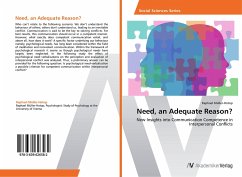Who can't relate to the following scenario: We don't understand the behaviour of others; others don't understand us, leading to an inevitable conflict. Communication is said to be the key to solving conflicts. For best results, this communication should occur in a competent manner. However, what exactly does competent communication entail, and above all, how does it work? A specific factor underlying our behaviour namely, psychological needs, has long been considered within the field of meditation and nonviolent communication. Within the framework of psychological research it seems as though psychological needs have largely been neglected. In the following study the effect of psychological need verbalisations on the perception and evaluation of interpersonal conflict was analysed. Thus, a preliminary answer can be provided for the following question: Is psychological need-verbalisation a possible criterion for competent communication within interpersonal conflict?
Bitte wählen Sie Ihr Anliegen aus.
Rechnungen
Retourenschein anfordern
Bestellstatus
Storno








